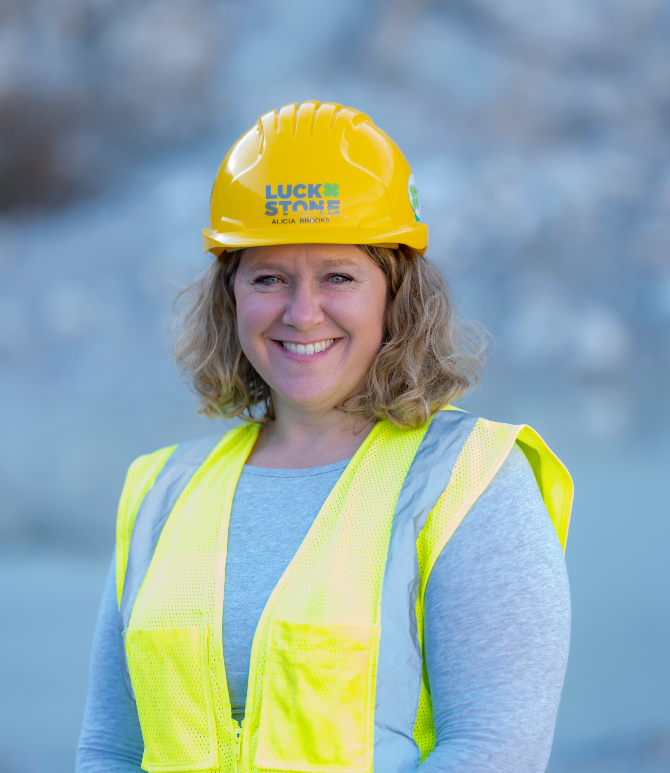Two Women of Asphalt: Meet Luck Stone’s Alicia Brooks and Mary Ann Clark
BY Sandy Lender

What good is crushing rock if you don’t have solid service management to move that rock from quarry to customer? Luck Stone, headquartered in Virginia, is proud to highlight two of their women of asphalt who are on the team to handle accounts.
Strategic Account Manager Mary Ann Clark joined Luck Stone in January 2002 and supports:
- forecasting to assist production to meet demand for product based on mix designs, projects on hand and FOB work;
- working with the managers of different customers to price products on both an annual and job-by-job basis depending on their customer;
- working with quality control to support mix design development;
- sharing information on potential business opportunities, association news, and safety practices; and
- providing digital training on new platforms Luck Stone offers.
Technical Sales Support Specialist Alicia Brooks joined Luck Stone in June 2018 and describes her position as a support system for the sales team. “We hold our customers’ success as one of our top priorities,” Brooks shared.
Brooks has had the opportunity to mentor another female in the industry through the Women of Asphalt (WofA) in the mentorship’s inaugural year and is now the vice chair for the WofA Virginia chapter. Virginia Asphalt Association Technical Director Mike Dudley nominated her, and VDOT Assistant Materials Engineer Rob Crandol seconded, as the Southeast Asphalt User Producer Group Aggregate subcommittee chair for 2020. “I have worked with these asphalt professionals in the asphalt production and quality realm for years prior to my Luck Stone onboarding. I am excited to be employed in a capacity where I can keep my previous asphalt relationships.”
Both of these women were willing to share their paths and insights into becoming women of asphalt.

Alicia Brooks is a technical sales support specialist for Luck Stone. She joined the team in June 2018, but celebrates 21 years in the industry in 2021.
AsphaltPro: What was your first position with Luck Stone and what did you find most rewarding about it?
Alicia Brooks: Luck Stone hired me as the technical sales support specialist to maintain a position on the customer experience team. The most rewarding part of my job is being able to have conversations inside the company about asphalt with coworkers who share my passion about the topic. I often find myself “translating” the customer’s needs into the sales or production language.
Mary Ann Clark: My first position with Luck Stone was as a sales representative for the Powhatan plant. The most rewarding thing about that position, which I held for seven years, was the relationships built with our production plant teams and working with our customers to grow and advance their businesses. An example would be watching a small family-owned paving contractor grow from paving driveways and making small repairs to opening their very first asphalt plant in 2008.
AsphaltPro: Could you share with the readers your career trajectory and what challenges you’ve overcome along the way? Tell us what part of your education relates best to the career track you’re on.
Alicia Brooks: My goal upon graduating high school was to attend college and become a marine biologist. Two years into my degree, the college changed the requirements of my goal to a five-year commitment. At the time, I was not eager to incur more student loan debt. I shifted to minor in education where I thought I would teach until I repaid my loans. Three years out of college and unexpectedly finding myself a single parent, I decided teaching wasn’t lucrative enough to raise a child without additional financial support.
I answered an ad in the paper for a nuclear gauge technician. I had no idea testing asphalt was necessary in any fashion. My on-the-job training began immediately. My pay was determined by the certifications that I attained, which I fast tracked. I took all the required training classes that qualified an individual for testing, designing and producing asphalt.
While it felt like I was starting over at the time, I took a chance on myself and my abilities to advance. I worked two years as an asphalt road technician, three years as a lab technician and three years as the lab manager. When I finally trained as an asphalt lab manager and an asphalt field manager, I was then able to oversee the QA program and maintain the environmental permits necessary for asphalt plant operations. Eighteen years of asphalt experience led me to the best job I have ever had here at Luck Stone.
Having familiarity with the customer’s product was most attractive to my employers. While it was required that I have a degree, the experience that I gained from the asphalt industry—testing, managing and designing products—was what made me a unique candidate for this position.
A Woman of Asphalt: Meet Gabriel Contractors’ Kristi Vertucci
Mary Ann Clark: Once I completed high school, I moved to Richmond and obtained my bachelor’s degree in business management from Virginia Commonwealth University. During my sophomore year, I started to work for Overnite Transportation Company (now UPS Freight) as a part of VCU’s Cooperative Education Program. I was thrust into working for a Fortune 500 Company at a young age and developed a very specific set of customer service skills, many of which I still use today.
After graduation I worked for a petroleum distributor and hauling company, Transport South (now Kenan), as the sales manager over Maryland, Virginia, West Virginia and North Carolina. In 1998 I joined Carter Machinery, the Caterpillar equipment dealer for the eastern half of Virginia, selling heavy and light construction equipment. In December 2001, I left Carter Machinery and made my home at Luck Stone.
My 25-year post-college career has been primarily in sales. The biggest obstacle I have faced was that there were times when it was very lonely on the road. Sales is often a one-person show and you’re in your truck for hours by yourself. You must learn the skill of connecting with other people and have a healthy dose of curiosity to keep you engaged, active and sharp—and you have to be a little fearless and look forward to the unknown because every day can be a new adventure!
When I was hired, one of my mentors told me, “It will take you five years before you even have a clue what you’re doing.” I thought he was nuts. Well, as it turns out, he was right.
The world of aggregate sales as it relates to the asphalt industry is somewhat of a different animal. The education component that is most reflected in the work we do with our asphalt partners would involve learning the value and process of critical thinking (a class I took in college). I call it “being able to think around a corner.” If X happens, then what are the possible outcomes? How will those outcomes affect the customer and Luck Stone? Another important piece of education is operations management. This enables you to develop a skill of sharing the technical aspects of production with your customers in a way they more clearly understand in an effort to support accurate forecasting, product movement and distribution.
AsphaltPro: What about “strategy” and “forecasting” in the asphalt industry is most rewarding to you?
Mary Ann Clark: The most rewarding part of forecasting is extracting the information from the customer, navigating it through our systems, delivering it to our customers and their plants so they can produce a mix and complete their project in a seamless manner. It’s about working together over a period of time to refine how we share and use information to improve accuracy, as well as inventory management.
AsphaltPro: What do you think is the most important skill you’ve brought to your position in the industry?
Alicia Brooks: The position requires courage to seek knowledge when necessary, whether it’s research or connecting with another professional with whom you are unacquainted. It requires courage to speak on topics that are new with no previous data to support it. I would challenge women just entering the industry to acknowledge that they will have to be courageous to speak on their own behalf in ways they never thought would be required. If I could offer a piece of advice around building courage, it would be to remember that it can indeed be built. It is a choice to speak or be silent. It is a choice to have your own convictions or go along even if you don’t agree. Find the times in your personal life when you were most courageous and apply that same fervor to your industry decisions.
Mary Ann Clark: The most important skill I bring and the most important skill needed are not necessarily one and the same. I’m very effective at connecting with customers and building relationships over time. I believe the most important skill is listening—listening for both the customer’s spoken and unspoken needs. I would encourage others entering the industry to work on asking the really hard questions, look people in the eye and then really commit to listening to the answer exactly as your customer tells you. Put yourself in the customer’s place and think through various creative ways you may support working towards a win-win outcome.
AsphaltPro: What would you say was the most challenging “obstacle” you, as a female in the asphalt industry, had to overcome, and how did you overcome it?
Mary Ann Clark: This is a job in which we find ourselves working with high ranking Department of Transportation associates, lobbyists, owners of companies and longtime “Industry Mega-Players” and that can be intimidating. About six years ago, I realized they are just like the rest of us—making a living for their families and doing something they were passionate about each day. I started asking the really difficult questions, talking less, listening more and being more direct. I stopped acting and talking like a subordinate who always said “Yes, Sir/No, Sir,” because this was actually putting me at a disadvantage. After I made this change, the tone of the conversations with industry leaders became more of a peer-to-peer discussion.
Alicia Brooks: The most challenging obstacle that I have had to overcome in the past few years is to listen more intently and more carefully. In the beginning of my career I felt so compelled to prove myself by planning an action, performing the action, and repeating the action to be worthy. I fear that I was neglectful in listening as well as I could have. I have just recently learned to find my voice and hear others’ voices simultaneously.
AsphaltPro: How do you think other women in the industry can incorporate that “listening to all voices” skill into their workdays?
Alicia Brooks: When we can share in platforms like this, we are able to support each other. Hearing the stories that other females have experienced is the confirmation to our peers that “I am not the only one struggling with this conflict.” Recognition of the obstacle is the first step. Listen to coworkers for suggestions, be open to change, and ask for help when you need it. Then listen to recommendations that are being suggested. It’s not a sign a weakness to need help as we may have been taught previously. Invest in making relationships that require you to listen to the point of view of others. While asphalt careers are very skill-specific, there is more than one successful way to perform the skill and be successful.
AsphaltPro: You listed troubleshooting quality issues and balancing customer needs with product availability as a collaborative project you are a part of. Can you give an example of a time when you (or you and a colleague) performed troubleshooting to get the right product lined up for a customer?
Alicia Brooks: Luck Stone has numerous collaborative efforts and I would like to share a story around the testing needs of our customers. It was brought to our attention that customers were needing and desiring more frequent testing. Collectively with our sales group, product support group and leadership, we were able to survey the customers, ascertain a change in business need for them, and increase some material testing frequencies, which will assist customers with their product usage decisions. We changed a testing frequency protocol in direct response to the customers’ needs.
AsphaltPro: How did that success “feel” or influence your outlook on your job?
Alicia Brooks: Experiencing the success of a project where you are changing old habits for new ones is euphoric to me. When the business needs of customers are changing, we need to be able to change with them to continue to provide them with the service they deserve.
AsphaltPro: You listed working with quality control to support mix design development as one of your responsibilities. Can you give an example of this and how the process is collaborative in your department/company? What level of satisfaction does success in mix design development bring you professionally?

Clark finds joy in the success of others. “The most rewarding aspect of the asphalt business for me is watching our customers be successful on bid work or completing heavy civil projects. I enjoy taking that information, on-the-job stories and even pictures back to our associates who make it happen every day in our scale offices and production/distribution locations.”
Mary Ann Clark: I learn something from our quality control team every single time we have an interaction. That Central Lab group is a partner in all we do for our asphalt customers. Our QC members with asphalt expertise join us on calls with asphalt customers to determine needs, upcoming challenges, potential pitfalls or creative solutions. The satisfaction comes in supporting our customers all the way from mix design to paving completion as well as nurturing the relationships formed along the way.
AsphaltPro: What do you think is an incorrect perception that we, as an industry, can re-educate young people about to encourage more women to consider a career in the asphalt business?
Mary Ann Clark: I believe that the construction industry is one of the hidden jewels in the professional world today, especially for young women. There is a perception that if you’re in construction you must wear a hard hat and swing a hammer all day. While I’m sure that’s the case in some segments of the construction industry, the asphalt and aggregate components of construction hold a broad and deep array of roles that bring tremendous satisfaction and personal growth. Aspects like engineering, sales, digital platforms, estimating, materials management and business development are all in construction but don’t always embody the typical look and feel of a construction worker. Dig in and explore the different segments of construction and compile as many ideas as you possibly can that hold interest for you.
Alicia Brooks: While physical strength is often assumed to be a requirement for most construction careers, including asphalt, women can compensate in many ways. For example, on occasions where the job requires being able to lift 75 pounds, it doesn’t mean all at one time. I have been able to split many 75-pound loads into more than one trip. It was a safer way to do it as well. The job also requires patience, because plant production, asphalt lay-down, asphalt testing and asphalt maintenance exercises can take long stretches of time to complete.
AsphaltPro: What is something you would tell a young lady to encourage her in this industry?
Alicia Brooks: Asphalt design, production and recycling will forever be a societal necessity. Learn this trade and you will always have an employable, expandable and sought-after skillset. It is a niche that you can develop into your own path after learning the basics in three to five years.
AsphaltPro: What is the most challenging aspect for you of being in the asphalt business?
Alicia Brooks: The most challenging aspect for me as a female in the asphalt industry is wondering, “Would this have happened if I were a man?” Growing up as one of three girls, I loved to fish, get dirty and bring my dad tools on his building construction sites. This type of father-daughter interaction stopped in my teens because my dad felt that he needed to protect me as a young lady—something that likely wouldn’t have happened if I had been a boy. I have faced some of those same experiences during my asphalt career.
I power through the challenging aspects with the courage and patience, and I exercise daily. In addition to those, I have perpetual hope that we are being evaluated and recognized for the numerous contributions we provide.
Mary Ann Clark: The most challenging aspect of my role is by far the detailed, technical component of the work. Mix designs can be extremely challenging because even when you believe you have all of the mix elements correct, the final product can still “act” differently once it’s produced. Getting that perfect mix that runs through the plant, through the pavers and ultimately is placed on the road is hard work. Fortunately, we have a Central Laboratory that helps to coach, advocate for, and educate both the sales team and our customers to ensure the highest quality products go into their mixes. It’s absolutely a “One Team” effort.
AsphaltPro: What is the most rewarding aspect for you, personally, of being in the asphalt business?
Alicia Brooks: I love the product. I love the process before the product. I love the smell of the asphalt, the design of the material and the sweat and long days that accompany a good job for which our own tax dollars pay. I love riding over a piece of road and saying, “I designed that, I tested that, and it will be appropriate for my child and loved ones to drive on.”

Mary Ann Clark is a strategic account manager for Luck Stone. She joined the team in January 2002 as a sales representative at the company’s Powhatan plant.
Mary Ann Clark: The most rewarding aspect of the asphalt business for me is watching our customers be successful on bid work or completing heavy civil projects. I enjoy taking that information, on-the-job stories and even pictures back to our associates who make it happen every day in our scale offices and production/distribution locations. Riding down a road or interstate and knowing your team had a hand in building it is a great reward!
Mentors
AsphaltPro: Tell us about a person who served as a mentor for you:
Alicia Brooks: Mr. Paul Willis is one of the finest people I have met and provided some of the best support and career advice I ever received.
Paul hired me as his first female employee at a site and celebrated the fact that I was a female. Paul allowed me to order women’s versions of the company gear. Paul encouraged the wives of the men at the site to come and meet me. He encouraged my determination for expedited learning. He was the first man that I had worked with in the industry to see me as a coworker who happened to female, not a female worker.
Paul’s actions spoke loud and clear. There are men who can look at females as equal coworkers and still embrace the unique qualities that men and women bring to every job. Be confident in your contributions as a human. Worthy leaders will discover your abilities and assist you with recognizing and improving on the shortcomings that all humans have.
Mary Ann Clark: There are two: Hardy Josephson and Rick Rowland. Two extremely different styles, both customer-centric and competitive in their own way.
Hardy is extremely outgoing and taught me to look for different cues in body language, to notice what was hanging on the customer’s wall, to remember their family members’ names. Customers really do want to know how much you care before they care how much you know. Hardy would just stroll into someone’s office or drive through someone’s stockyard. He would always say, “Act like you’re supposed to be here.” Hardy told me that if you’re not having fun doing what you do every day, find something else. Also, he advised me to make every interaction meaningful so that when a customer had a need, perhaps not even stone related, I was the first person they thought of.
Rick really helped me dial into my business acumen and helped me to see that even the tiniest detail on a quote or a spreadsheet can influence how a customer, or another associate, may perceive your work. Be nothing if not accurate. Check your work, double check it and then check it again. Rick also really supported my work towards my MBA that will be complete in August 2021.
Both of these mentors have their associates’ well-being as their North Star and have a genuine love for the success of others.
The advice they offered: Don’t be afraid to fail—just don’t make the same mistake twice. Remember important dates. It will forever be appreciated by your customers and associates. Have a Servant Heart. Be curious. Ask questions, then listen. Most importantly, make a plan and execute it. The plan may change 50 times along the way, but without a plan you’re simply floating. Always stand up for what is true, right and just.
